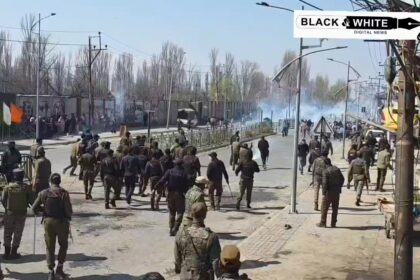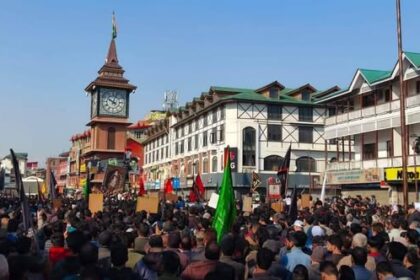First District-Level Justice Coordination Committee Meeting Held in Shopian to Strengthen Legal Infrastructure and Institutional Synergy
Under Chief Justice’s Directives, Judiciary and Civil Administration Collaborate to Enhance Judicial Efficiency, Address Infrastructure Challenges, and Promote Timely Justice
||Black and White Digital News ||
||Parvinder Singh April 09,2025 ||
Introduction: A Landmark Step Toward District-Level Judicial Reforms
In a major move aimed at institutionalizing a more coordinated and responsive justice delivery framework, the First Coordination Committee meeting of District Shopian was convened today at the District Court Complex. This initiative, held under the direct instructions of the Chief Justice of the High Court of Jammu & Kashmir and Ladakh, reflects the judiciary’s evolving strategy to engage with executive, enforcement, and civil institutions at the grassroots.
The goal: to remove bottlenecks, streamline coordination, and ensure citizen-centric justice delivery with a particular focus on infrastructure augmentation, resource allocation, and timely redressal of grievances.
Institutional Composition: A Unified Front for Justice
The meeting was chaired by Mehmood Ahmad Chowdhary, Principal District & Sessions Judge and Chairman of the Coordination Committee. It brought together a diverse pool of stakeholders, each playing a vital role in the justice ecosystem. Notable attendees included:
• Judicial Officers: Sheikh Gowhar Hussain (Sub Judge/CJM & Secretary of the Committee), Mudasar Farooq (Secretary, DLSA Shopian)
• District Administration: Shishir Gupta (Deputy Commissioner), Anayat Ali Choudhary (SSP Shopian), ACR Shopian, Tehsildar Shopian
• Infrastructure & Utilities: Superintendent Engineer PWD/R&B Pulwama-Shopian, Executive Engineers of Jal Shakti and KPDCL Shopian
• Correctional Services: Superintendent, Special Jail Pulwama
• Prosecution & Legal Officers: Deputy Director Prosecution (South), Public Prosecutor, District Court Shopian
• Urban & Social Development: Chief Executive Officer, Municipal Committee Shopian, and Child Development Project Officer (CDPO) Shopian
This inclusive forum was carefully structured to ensure that every institutional layer connected to the justice system was represented, recognizing that effective justice delivery goes beyond courtrooms.
Core Issues and Deliberations: Beyond the Courtroom
The Committee’s deliberations were centered around three thematic priorities:
1. Infrastructure Gaps:
• The need for modernization of court buildings, dedicated spaces for legal aid, digitization of records, and basic amenities for litigants
• Emphasis on maintenance of judicial infrastructure and speedy completion of pending civil works
2. Institutional Coordination:
• Strengthening communication channels between the judiciary and key departments (police, prosecution, municipal bodies, power and water departments)
• Creation of a standard operating protocol for handling issues like court summons delivery, production of undertrials, and law enforcement support
3. Litigant-Centric Reforms:
• Streamlining services for litigants such as legal aid, timely trials, witness protection, and efficient scheduling
• Focus on public outreach to raise awareness about legal rights and free legal services available through the District Legal Services Authority (DLSA)
Judge Mehmood Ahmad Chowdhary urged the participants to treat the justice system as a shared responsibility, calling for a shift from siloed functioning to collaborative problem-solving. He underscored that justice delayed is justice denied, and urged each department to address their part in the chain.
Larger Significance: Judicial Decentralization and Collaborative Governance
This meeting represents a paradigm shift in judicial administration—from reactive measures to preventive, collaborative governance. At a time when public faith in institutions hinges on speed and accessibility, such forums allow:
• Real-time issue identification
• District-level data sharing
• Tailored solutions grounded in local realities
Importantly, these meetings serve as a feedback mechanism for the High Court to assess district-level challenges and tailor policy decisions accordingly. It’s an example of “justice governance”—where justice is not confined to court judgments but extends to all elements that enable or delay access to justice.
Looking Ahead: What This Meeting Means for Shopian
Shopian, like many districts in the region, faces unique challenges—geographical constraints, resource gaps, and socio-political complexities. The success of this Committee will be measured by:
• Implementation of action points discussed
• Periodic review meetings to monitor progress
• Institutionalization of the Committee as a permanent mechanism, not a one-off exercise
If followed through, this initiative could serve as a model for other districts across Jammu & Kashmir and Ladakh, proving that justice reform need not always start at the top—it can begin where the people
Leave a comment
You Might Also Like
Police use tear gas shells to disperse people protesting the killing of Iran’s supreme leader, Ayatollah Ali Khamenei, in Srinagar.
Police use tear gas shells to disperse people protesting the killing of Iran’s supreme leader, Ayatollah Ali Khamenei, in Srinagar.…
0 Min Read
Mehraj Malik Aam Logon Ki Bat Karta Tha Isliye Uspar PSA Laga Diya CM Omar Abdullah Sahab Nhi Chahte Wo Bahar Aaye Amit Kapoor
Mehraj Malik Aam Logon Ki Bat Karta Tha Isliye Uspar PSA Laga Diya CM Omar Abdullah Sahab Nhi Chahte Wo…
0 Min Read
Ayatullah Khameni Shaheed Huve Hai Na Jhuke Hai Na Jhikege Protest In Bathandi Jammu
Ayatullah Khameni Shaheed Huve Hai Na Jhuke Hai Na Jhikege Protest In Bathandi Jammu
0 Min Read
Iran’s Supreme Leader Ayatollah Ali Khamenei, Who Led The Islamic Republic Since 1989, Is Dead At 86 Protests In Kashmir Against Killing Of Iranian Leader Khamenei
Iran’s Supreme Leader Ayatollah Ali Khamenei, Who Led The Islamic Republic Since 1989, Is Dead At 86 Protests In Kashmir…
0 Min Read









